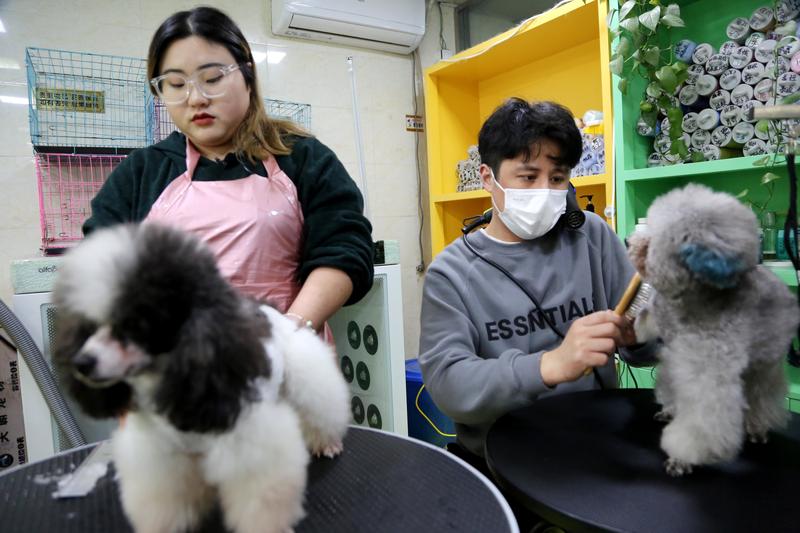 Employees groom dogs at a pet boarding store in Lianyungang, Jiangsu province. (WANG CHUN / FOR CHINA DAILY)
Employees groom dogs at a pet boarding store in Lianyungang, Jiangsu province. (WANG CHUN / FOR CHINA DAILY)
Optimization of COVID-19 measures that enabled countrywide travel and customary family reunions for Spring Festival in late January has also boosted the business of pet service solutions in China, industry observers said.
During the weeklong holiday, families with pets depended on commercial services like pet hotels, pet boarding units and pet-sitting firms to ensure their furry friends were well cared for while they were away.
Liu Xin, a 30-year-old office clerk who had just returned to Beijing for work from her hometown in Wuhan, Hubei province, said she spent over 1,200 yuan ($178) on one such service.
"Normally, the daily cat boarding fee is around 120 yuan. But the price soared to 180 yuan this year, bringing the total amount for seven days to 1,260 yuan — an amount that can buy pet food for two to three months," Liu said.
"There wasn't time to ponder the price surge as there weren't many rooms available. I had to make a reservation before the holiday started and pay the deposit in advance."
Her experience likely resonates with hundreds of millions of pet owners in China.
Du Xiaolan, a shop assistant at an outlet of Coolbaby Pet Store, said: "In the month before Spring Festival (December), there had been an increasing number of consumers coming to the store to inquire about pet boarding during the holiday. The demand soared two to three times compared to the previous year.
"A week before Jan 22, when Spring Festival started, our orders peaked. At that point in time, the nearest date available was the fifth day of the Lunar New Year."
Apart from providing rooms, pet hotels offer many other services, including feeding and cleanup.
"Our store is equipped with remote monitoring, so that consumers can check their pets whenever they want," Lu said.
"The surge in prices was mainly due to the rise in labor costs," said Bai Lu, an expert in pet consumption with the Jingzhe Research Institute.
Du said that during the holiday, workers' daily wages rose by 400 yuan to 500 yuan. According to the labor law, workers enjoy daily wages three times the normal tag for working during holidays.
According to Coolbaby Pet Store, which is a 180-square-meter facility that can accommodate 40 cats or 20 dogs, daily revenue could reach 5,000 yuan to 6,000 yuan during the Spring Festival holiday.
"Pet services boomed as, unlike in recent years, an increasing number of people chose to go back home for the Spring Festival holiday this year. And many of them went back ahead of time. However, this boom is periodical and won't last long," Bai said.
She said pet owners turn to pet boarding only during long holidays, such as Spring Festival and the National Day Holiday in October. Some pet owners, however, may ask their friends a favor and hand over their pets for care during short breaks.
"Therefore, income from pet boarding can be regarded as a supplement to the pet store's main revenue streams, which are pet food, medicine, clothing, toys, other goods, accessories and grooming services," Bai said.
Hong Yong, an associate research fellow at the e-commerce research department of the Ministry of Commerce, said: "Apart from pet boarding, they can offer services like pet grooming and selling pet food. In this way, they can increase revenue sources, enrich service content, attract more consumers, and find opportunities for sustainable business development.
"Pet stores may also take advantage of social media to popularize themselves. In addition, they should enhance their service quality, to satisfy diversified demand and realize sustainable development."


